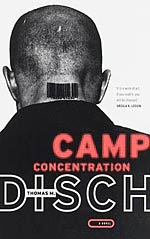
![]() niriop
niriop
7/21/2020
![]()
I read my first Disch novel a good year and a half ago now--The Businessman: A Tale of Terror.
While that book was immensely readable and geared to commerical viablity (while retaining its breadth of ideas), a fantasy-horror novel meant as Disch's answer to the rising popularity of King and Koontz, Camp Concentration is soldily a work of New Wave science fiction. Its prose can be very dense, an attempt to have a purposely "literary" form, and its ideas (and the staging of those ideas) can be so complex that one wonders if reading it a second or even third time would make for better understanding and appreciation.
The central protagonist of Sacchetti I believe is meant by Disch to not be entirely sympathetic--he is pompous, snobby, rambling, arrogant, an adulterer, (to an extent) intellectually dishonest, and an obese compulsive overeater, and the effects of the drug Pallidine he is given do not lessen these flaws (other than killing his hunger as he wears away) or make him more humble, but this is not really an issue as he is at least an interesting character and, at times, very amusing.
Those parts that show Disch's prose at its best are very quotable.
The dominant theme of the book is not actually political oppression and war--although those do loom large in the narrative--but ethics and theology. There is a particular exchange between Sacchetti and Mordecai, the prisoner ultimately responsible for Sacchetti's apparent doom, in which the latter pronounces Himmler a saint due to his practice of mechanised suffering, a realisation of Hell on Earth, and, by default, the glory of creation and of God's will. Sacchetti, a reborn Catholic, rejects this notion as disgusting and blasphemous, but it signifies the beginning of the poet's loss of faith in God, and as the Pallidine takes further tolls, he is given to religious/anti-religous rants, and even night-time visions of a gluttonous Thomas Aquinas.
In these theological concerns, Camp Concentration is directly comparable to The Businssman, but whereas the latter is focused on the afterlife, the former is primarily focused on ethics, moral duty, personal integrity, faith, and theodicy. However, both reflect on the nature of evil in human life and decisions.
SPOILER
I admit I found the ending disappointing. I don't find it totally believable (even in such a surreal narrative) that the other prisoners faked an interest in alchemy the whole time to cover for their discovery of a process for swapping minds between bodies. I was also oddly disappointed that I wasn't given an unhappy ending, which is what is to be expected with such a plot. However, maybe that's the point--Disch goes against your expectations like any great author should, and maybe I should shut up.
SPOILER OVER
Despite all that, I will recommend Camp Concentration to those interested in New Wave SF and good prose, and I will probably re-read it sometime in the future.